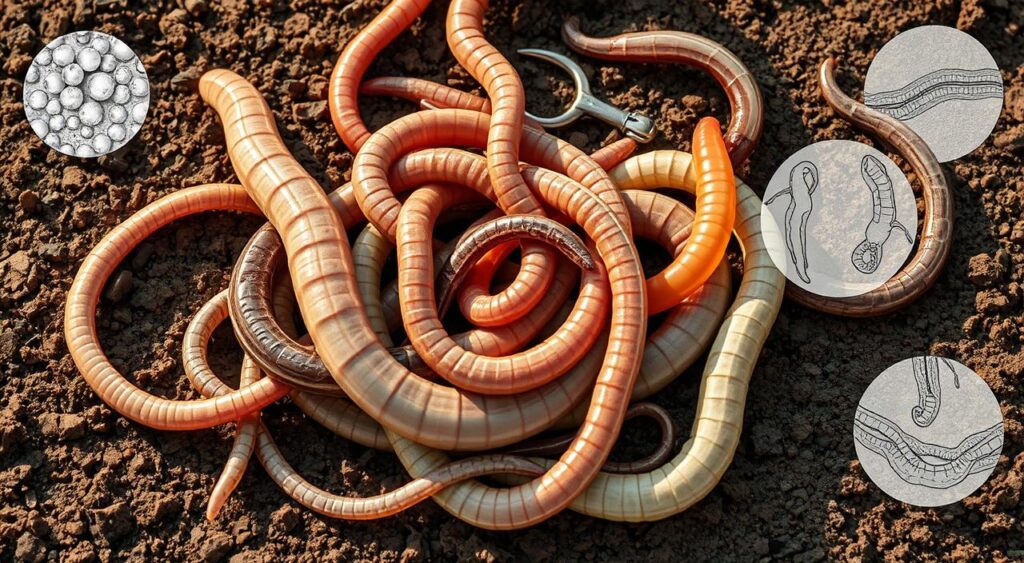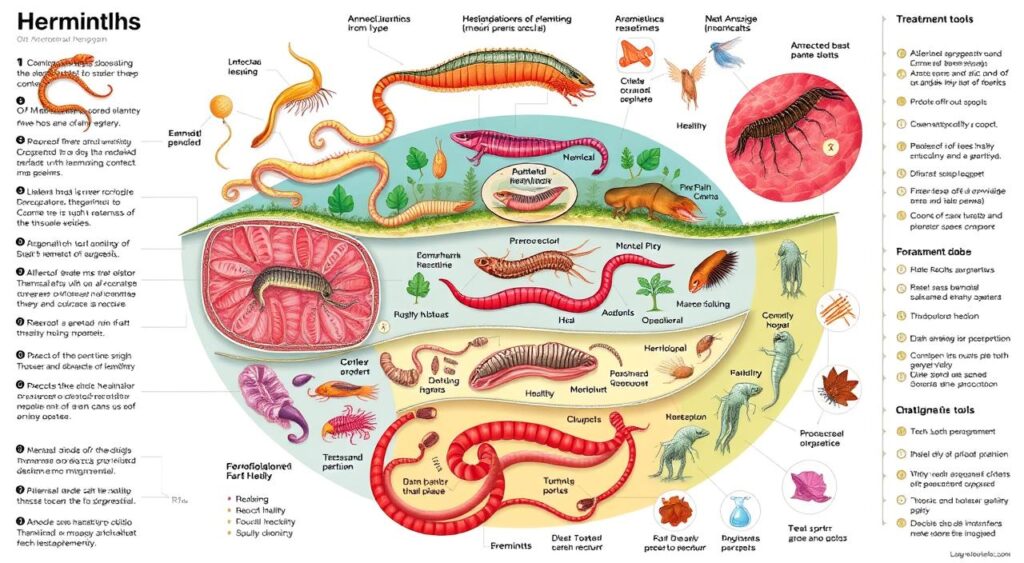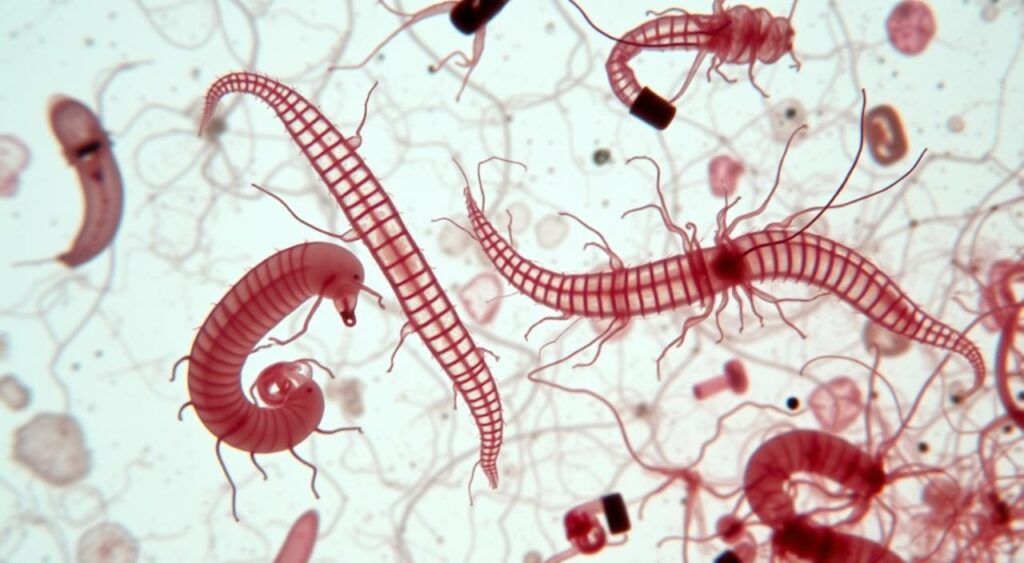Over 1.5 billion people worldwide suffer from mixed worm infections. This condition can cause serious health problems if not treated. Mixed worm infections, or helminthiasis, happen when someone has more than one type of parasitic worm. It’s vital to know how to handle this condition to improve one’s life quality.
Helminthiasis is a big issue, especially in places where clean water and sanitation are scarce. It can cause everything from mild discomfort to serious health issues. If symptoms don’t go away, it’s important to see a doctor. Knowing the causes, symptoms, and treatments can help prevent and manage mixed worm infections.

Dealing with mixed worm infections can be tough, but it’s doable with the right strategy. By listening to expert advice and taking precautions, people can lower their risk of getting mixed worm infections. This can greatly improve their health and wellbeing.
Key Takeaways
- Mixed worm infections affect over 1.5 billion people worldwide, making it a significant public health concern.
- Helminthiasis can lead to severe health complications if left untreated, emphasizing the need for prompt medical attention.
- Understanding the causes and symptoms of mixed worm infections is crucial for effective management and prevention.
- Access to clean water and sanitation is essential for preventing mixed worm infections.
- Seeking medical attention and following expert advice can help individuals manage and prevent mixed worm infections.
- Early diagnosis and treatment can significantly improve health outcomes for individuals with mixed worm infections.
Understanding Mixed Worm Infections: A Comprehensive Overview
Helminths, or parasitic worms, are a big problem worldwide. They affect human health a lot. These worms include nematodes, trematodes, and cestodes. Knowing about them helps us fight mixed worm infections better.
Many people have helminth infections, especially in certain areas. Parasitic worms can make people sick in different ways. It’s important to know about the different worms to prevent and treat infections.
Definition and Basic Concepts
Helminths are parasitic worms that harm humans. The main types are:
- Nematodes (roundworms)
- Trematodes (flukes)
- Cestodes (tapeworms)
Types of Parasitic Worms Involved
Each worm type affects humans differently. For instance, nematodes can infect the intestines. Trematodes can harm the liver and lungs.
Global Prevalence and Impact
Helminth infections are common worldwide, affecting millions. These worms can harm health and the economy for a long time. Knowing how widespread they are helps us find better ways to stop and treat them.
| Type of Parasitic Worm | Health Effects | Global Prevalence |
|---|---|---|
| Nematodes | Intestinal infections | Millions of people affected |
| Trematodes | Liver and lung infections | Thousands of people affected |
| Cestodes | Intestinal infections | Hundreds of people affected |
Common Symptoms of Helminth Co-infections
Helminth co-infections, which include intestinal worms like nematodes, show many symptoms. These signs can change based on the worms, how bad the infection is, and the person’s health. Common signs are stomach pain, diarrhea, losing weight, and feeling very tired.
With nematode infections, symptoms can get worse. This can include blockages in the intestines or not getting enough nutrients. It’s important to know these symptoms to get medical help fast. Some key symptoms to watch for are:
- Abdominal pain and tenderness
- Diarrhea or bloody stools
- Weight loss and decreased appetite
- Fatigue and weakness
It’s vital to remember that intestinal worms can cause serious health issues if not treated. Nematodes can lead to severe problems like blockages in the intestines or malnutrition. If you have any of these symptoms, seeing a doctor is crucial for the right diagnosis and treatment.
Getting help early can greatly improve your health and prevent long-term problems. Knowing the common symptoms of helminth co-infections helps protect your health. If you notice any symptoms, don’t hesitate to get medical help.
Risk Factors and Transmission Routes
It’s important to know how mixed worm infections spread. Things like dirty water and soil can carry trematodes and cestodes. These worms have life cycles that involve other hosts, making them tricky to track.
Several things can increase your chance of getting these infections. These include where you live, how you behave, and the environment around you. For instance, bad sanitation and hygiene can lead to infections. Here are some main ways these worms spread:
- Contaminated water and soil
- Poor sanitation and hygiene
- Geographic location, particularly in tropical and subtropical regions
- Behavioral practices, such as eating undercooked meat or raw vegetables
Knowing how these worms spread helps us find ways to stop them. By reducing our risk, we can keep ourselves and others safe from these infections.
Where you live also matters a lot. Places near the equator are more likely to have these worms because of the right conditions and hosts.
| Parasite | Transmission Route | Risk Factors |
|---|---|---|
| Trematodes | Contaminated water and soil | Poor sanitation and hygiene, geographic location |
| Cestodes | Undercooked meat and raw vegetables | Behavioral practices, geographic location |
Diagnostic Approaches for Mixed Worm Infections
Diagnosing mixed worm infections needs a detailed approach. This includes clinical evaluation, lab tests, and sometimes imaging studies. Getting the right diagnosis is key to choosing the right helminth treatment. This treatment might include medicines and supportive care.
The first step is a thorough clinical evaluation. Then, lab tests like stool exams and blood tests are done. Sometimes, imaging studies are needed to confirm the diagnosis. Here are some common ways to diagnose mixed worm infections:
- Clinical evaluation: A detailed medical history and physical check-up to spot symptoms and risks.
- Stool examinations: Lab tests to find parasitic worms in stool samples.
- Blood tests: Tests to find antibodies or antigens in the blood.
- Imaging studies: X-rays, CT scans, or MRI scans to see the internal organs and any damage.
Healthcare professionals use these methods together. This way, they can accurately diagnose mixed worm infections. Then, they can create a good helminth treatment plan.

Treatment Strategies and Medical Interventions
Treating mixed worm infections often means using antiparasitic drugs. The type and length of treatment depend on the infection. The main goal is to get rid of the worms and stop them from coming back.
The treatment plan can change based on how bad the infection is and the type of worms. Sometimes, doctors use more than one drug to tackle infections at the same time.
Antiparasitic Medications
Antiparasitic drugs are key in treating mixed worm infections. They target the worms and stop them from making more.
Combination Therapy Approaches
Combination therapy uses several drugs to fight off different infections. It’s a good way to get rid of many types of worms and lower the chance of getting infected again.
Duration and Follow-up Care
How long treatment lasts and follow-up care are very important. They help make sure all the worms are gone and prevent new infections. Patients need to be watched closely to make sure the treatment works and to handle any side effects.
Knowing about the different treatments and medical options helps people deal with mixed worm infections better. It also helps prevent getting infected again.
Prevention and Control Measures
Stopping mixed worm infections needs a mix of personal habits, clean environments, and group efforts. Knowing and using these steps can lower the chance of getting parasitic worms and intestinal worms.
Good hygiene is key to stop worms from spreading. This means washing hands often, throwing away feces right, and staying away from dirty water and soil.
Personal Hygiene Practices
- Wash hands regularly with soap and water
- Properly dispose of feces and urine
- Avoid eating undercooked meat and raw vegetables
Environmental Sanitation
Clean environments help stop worms from spreading. This means having clean water, throwing away trash right, and keeping soil and water clean.
Community-based Prevention Programs
Group efforts are vital to teach people about worm risks and how to avoid them. These efforts include spreading the word, teaching health lessons, and giving out ways to prevent worms.
By using these steps, people can lower their risk of getting worms. Communities can also work together to stop worms from spreading.
| Prevention Measure | Description |
|---|---|
| Personal Hygiene Practices | Regular handwashing, proper disposal of feces and urine |
| Environmental Sanitation | Improving access to clean water, proper waste disposal |
| Community-based Prevention Programs | Public awareness campaigns, health education, distribution of preventive measures |
Complications and Long-term Health Effects
Helminthiasis, caused by helminths, can lead to serious problems if not treated. It can cause malnutrition, as worms eat nutrients meant for the host. This can lead to weight loss, fatigue, and poor brain development in kids.
Some of the potential complications and long-term health effects of helminthiasis include:
- Malnutrition and related health issues
- Impaired cognitive development in children
- Weight loss and fatigue
- Increased risk of other infections and diseases
Understanding these complications shows why treating helminth infections quickly is key. Getting medical help and following treatment plans can help avoid long-term health issues.
Early detection and treatment are vital to avoid long-term health effects of helminthiasis. Being aware of these complications and taking action can protect your health and well-being.
| Complication | Description |
|---|---|
| Malnutrition | Helminths consume nutrients, leading to malnutrition and related health issues |
| Impaired cognitive development | Chronic infections can impair cognitive development in children |
| Weight loss and fatigue | Helminthiasis can cause weight loss and fatigue due to malnutrition |
Special Considerations for High-Risk Groups
Some groups face a higher risk of severe worm infections. These include children, pregnant women, and people with weakened immune systems. They need extra care because they’re more likely to get sick from nematodes and trematodes.
Pregnant women and their unborn babies are especially at risk. Hookworm infections can cause anemia and malnutrition in pregnant women. This can harm the fetus. Schistosomiasis, a trematode infection, can also lead to miscarriage and low birth weight.
Children and Pregnant Women
Children and pregnant women are more vulnerable to worm infections. Their immune systems are weaker. It’s important to avoid contaminated water and soil to prevent infections.
Regular health check-ups and screenings are also key. They help catch infections early. This allows for quick treatment and reduces the risk of serious problems.
Immunocompromised Individuals
People with weakened immune systems, like those with HIV/AIDS or undergoing chemotherapy, are at higher risk. They need to be extra careful to avoid nematodes and trematodes. This includes avoiding undercooked meat and unwashed vegetables.

Travel-Related Infections
Travelers to areas where worm infections are common are also at risk. It’s crucial to take preventive steps. This includes taking antiparasitic medications and avoiding contaminated water and soil.
Getting advice before traveling can also help. It can reduce the risk of getting infected while traveling.
| High-Risk Group | Special Considerations |
|---|---|
| Children | Avoid contaminated water and soil, regular check-ups and screenings |
| Pregnant Women | Avoid contaminated water and soil, regular check-ups and screenings, prompt treatment for infections |
| Immunocompromised Individuals | Avoid undercooked meat and unwashed vegetables, take extra precautions to avoid exposure to nematodes and trematodes |
| Travelers | Take antiparasitic medications, avoid contaminated water and soil, pre-travel advice and precautions |
Conclusion: Managing and Preventing Mixed Worm Infections
Managing and preventing mixed worm infections needs a mix of steps. These include accurate diagnosis, effective treatment, and prevention. Knowing the risks and how to act can help keep people healthy.
Good hygiene is key. Washing hands often and keeping areas clean can stop worms from spreading. Also, programs that teach about health and clean environments help a lot. They make communities stronger and healthier.
Working together is crucial. Healthcare teams, public health, and community members can make a big difference. By focusing on prevention and treatment, we can beat these health issues. This way, we aim for a future where these problems are solved.
FAQ
Q: What are mixed worm infections?
A: Mixed worm infections, also known as helminthiasis, happen when someone has more than one type of parasitic worm. These include nematodes (roundworms), trematodes (flukes), and cestodes (tapeworms).
Q: What are the common symptoms of mixed worm infections?
A: Symptoms can vary but often include abdominal pain, diarrhea, and weight loss. Fatigue and more serious issues like intestinal blockage or nutritional deficiencies can also occur.
Q: What are the risk factors and transmission routes for mixed worm infections?
A: Several factors increase the risk of getting mixed worm infections. These include contaminated water and soil, certain behaviors, and where you live. The way these worms spread can be complex, especially for flukes and tapeworms.
Q: How are mixed worm infections diagnosed?
A: Doctors use a few methods to diagnose these infections. They look at symptoms, do lab tests like stool exams, and sometimes use imaging. Accurate diagnosis is key to the right treatment.
Q: What are the treatment strategies for mixed worm infections?
A: Treatment usually involves antiparasitic medications. The type and length of treatment depend on the infection. Sometimes, doctors use more than one medication to treat different worms at once.
Q: How can mixed worm infections be prevented?
A: Preventing these infections requires good hygiene and clean environments. Regular handwashing and proper waste disposal are crucial. Community programs also help by teaching people about prevention.
Q: What are the potential complications and long-term health effects of mixed worm infections?
A: Long-term infections can cause malnutrition and affect brain development. If not treated well, they can lead to serious health problems.
Q: Are there any special considerations for high-risk groups with mixed worm infections?
A: Yes, some groups like children, pregnant women, and those with weakened immune systems face greater risks. They need careful management and tailored treatment plans.
